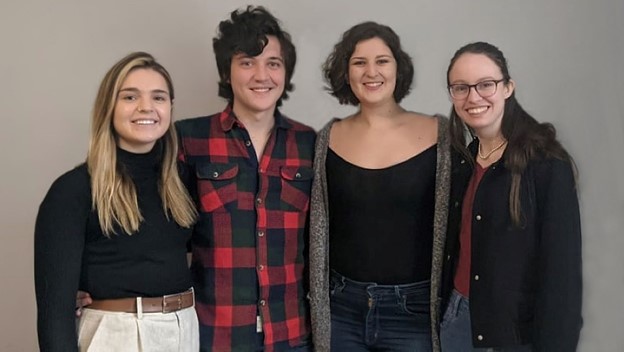CAPSTONE DESIGN PARTICIPANTS

Vivian Mai

Shaun Bradley

Mackenzie Goodwin

Jason Wu

Amy Zhang
Polynetic
6
Microplastics, which are polymer-based fragments with a characteristic size below 5mm, have significantly negative impacts on both the environment and human health. Having a robust microplastic detection system will speed up the analysis of microplastics in many sectors including research labs, waste-water management, and agricultural industry. Our project objective is to develop a technological demonstration of a rapid, accurate and affordable microplastic detection device. And our proposed solution is to employ resonance microwave spectroscopy and microfluidic system for microplastic detection.

Maria Zhang

Malik Salvosa

Jae (Jaehyung) Park

Brett Selby

Boris Kim
AlgoCube
7
Providing equal access to algorithmic trading platform for retail investors; eliminating the hurdle of having knowledge in programming to leverage backtesting algorithms by giving access to a platform that provides trading algorithms as various building blocks to assemble the strategies

Thomas Lim

Shalin Patel

Nicholas Qu

Anh Nguyen
roboHand
8
Team roboHand is an interdisciplinary capstone project looking to solve the issue of affordable prosthetic hands. With most prosthetics costing more than the median household income, this impactful technology has a high barrier of entry. We aim to design a hand that gives similar performance to those high end hands through simple mechanism design and modular attachments.

Naomi Paul, Ryan Lithgow, Gwyn Foster, Maggie Brewster
Bee Gee
9
The motivation for our project is the high rates of inadequate bystander cardiopulmonary resuscitation (CPR) in Canada – Only 40% of patients receive CPR and 48% of these cases involve improper CPR. We aim to design a CPR device that will aid the general public in performing CPR that does not require training to use, will increase the effectiveness of CPR by ensuring it is performed correctly, and may contribute to an improvement in willingness to provide CPR by removing the need for prior training.

Sabar Ahuja

Milind Paliath-Pathiyal

Michael Vytlingam

Linus Barbosa
Handy
10
The CDC recommends that people wash hands with soap with 'proper hand motion' for 'at least 20 seconds' and dry carefully afterward to execute a 'correct hand wash'. However, the CDC found that less than 75% of Americans wash their hands after coughing, sneezing, blowing their nose, handling food, or using the restroom. Additionally, a research study at a University campus discovered that only 5.3% of the 3,739 people sampled washed their hands for 15 seconds or more. The study also found that both men and women did not wash hands for the recommended time stated by the CDC and fell short by 6.27 and 7.07 seconds. Germs and viruses can survive on surfaces for up to 2-3 days, much more the reason to ensure people are washing hands correctly. We developed an intelligent hand washing device, Handy, that reminds and encourages users in washrooms to 'wash hands correctly' using sound recognition machine learning solutions. The smart device solves a more significant problem beyond encouraging users to wash hands correctly by mitigating the rapid transmission of germs and disease to provide safety for users and the community.